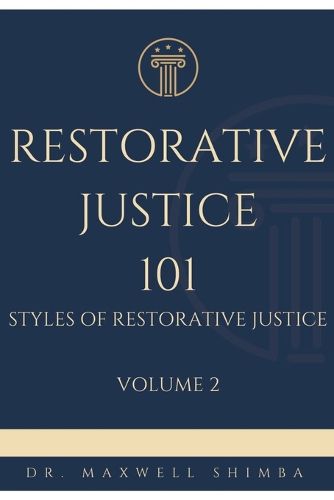Readings Newsletter
Become a Readings Member to make your shopping experience even easier.
Sign in or sign up for free!
You’re not far away from qualifying for FREE standard shipping within Australia
You’ve qualified for FREE standard shipping within Australia
The cart is loading…






This title is printed to order. This book may have been self-published. If so, we cannot guarantee the quality of the content. In the main most books will have gone through the editing process however some may not. We therefore suggest that you be aware of this before ordering this book. If in doubt check either the author or publisher’s details as we are unable to accept any returns unless they are faulty. Please contact us if you have any questions.
Restorative Justice 101
Restorative Justice: Styles of Restorative Justice by Dr. Maxwell Shimba
Introduction to Restorative Justice Dr. Maxwell Shimba introduces restorative justice as a transformative philosophy that prioritizes healing, accountability, and community cohesion over punitive measures. The book establishes a foundational understanding of restorative principles, exploring their historical roots and modern applications in addressing harm. Victim-Offender Mediation This section delves into victim-offender mediation, a core restorative practice. Dr. Shimba explains how facilitated dialogues enable victims to share their experiences, offenders to take accountability, and both parties to collaboratively work toward amends, with case studies showcasing its impact on recidivism and victim satisfaction. Community Conferencing The book highlights the power of community conferencing, which involves victims, offenders, and community members in structured dialogues. Dr. Shimba emphasizes its success in repairing relationships and fostering a sense of shared responsibility, particularly in school and neighborhood settings. Indigenous Justice Systems Dr. Shimba explores the contributions of Indigenous justice practices, such as peacemaking circles and clan-based resolution systems, to modern restorative justice. He demonstrates how these traditions emphasize interconnectedness and provide culturally resonant approaches to harm and reconciliation. Restorative Applications in Schools The book illustrates the transformative role of restorative practices in educational settings, detailing how classroom circles, restorative discipline policies, and peer mediation create inclusive environments that reduce conflict and improve relationships among students and staff. Restorative Justice in Criminal Systems Dr. Shimba critically examines the integration of restorative practices into criminal justice systems worldwide. The book presents comparative studies and analyses, demonstrating how these approaches reduce recidivism, empower victims, and address systemic inequities. Challenges and Best Practices Acknowledging potential obstacles, the book discusses challenges such as power imbalances, cultural sensitivity, and maintaining program integrity. Dr. Shimba provides evidence-based strategies to navigate these issues effectively, ensuring sustainable outcomes.
$9.00 standard shipping within Australia
FREE standard shipping within Australia for orders over $100.00
Express & International shipping calculated at checkout
This title is printed to order. This book may have been self-published. If so, we cannot guarantee the quality of the content. In the main most books will have gone through the editing process however some may not. We therefore suggest that you be aware of this before ordering this book. If in doubt check either the author or publisher’s details as we are unable to accept any returns unless they are faulty. Please contact us if you have any questions.
Restorative Justice 101
Restorative Justice: Styles of Restorative Justice by Dr. Maxwell Shimba
Introduction to Restorative Justice Dr. Maxwell Shimba introduces restorative justice as a transformative philosophy that prioritizes healing, accountability, and community cohesion over punitive measures. The book establishes a foundational understanding of restorative principles, exploring their historical roots and modern applications in addressing harm. Victim-Offender Mediation This section delves into victim-offender mediation, a core restorative practice. Dr. Shimba explains how facilitated dialogues enable victims to share their experiences, offenders to take accountability, and both parties to collaboratively work toward amends, with case studies showcasing its impact on recidivism and victim satisfaction. Community Conferencing The book highlights the power of community conferencing, which involves victims, offenders, and community members in structured dialogues. Dr. Shimba emphasizes its success in repairing relationships and fostering a sense of shared responsibility, particularly in school and neighborhood settings. Indigenous Justice Systems Dr. Shimba explores the contributions of Indigenous justice practices, such as peacemaking circles and clan-based resolution systems, to modern restorative justice. He demonstrates how these traditions emphasize interconnectedness and provide culturally resonant approaches to harm and reconciliation. Restorative Applications in Schools The book illustrates the transformative role of restorative practices in educational settings, detailing how classroom circles, restorative discipline policies, and peer mediation create inclusive environments that reduce conflict and improve relationships among students and staff. Restorative Justice in Criminal Systems Dr. Shimba critically examines the integration of restorative practices into criminal justice systems worldwide. The book presents comparative studies and analyses, demonstrating how these approaches reduce recidivism, empower victims, and address systemic inequities. Challenges and Best Practices Acknowledging potential obstacles, the book discusses challenges such as power imbalances, cultural sensitivity, and maintaining program integrity. Dr. Shimba provides evidence-based strategies to navigate these issues effectively, ensuring sustainable outcomes.